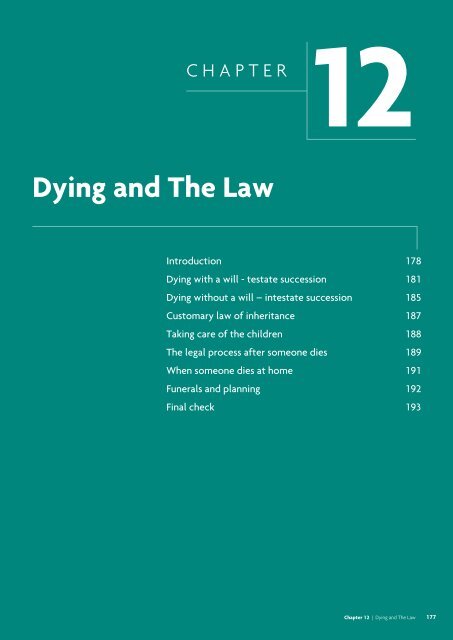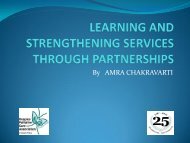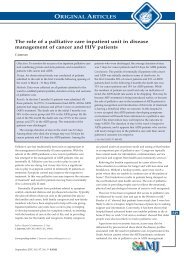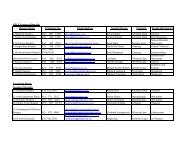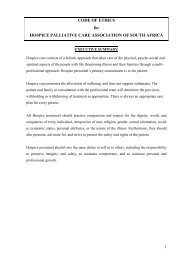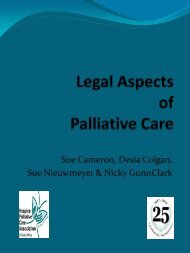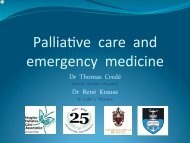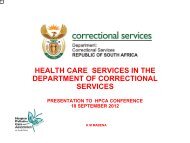Dying and The Law - Hospice Palliative Care Association of South ...
Dying and The Law - Hospice Palliative Care Association of South ...
Dying and The Law - Hospice Palliative Care Association of South ...
Create successful ePaper yourself
Turn your PDF publications into a flip-book with our unique Google optimized e-Paper software.
CHAPTER12<strong>Dying</strong> <strong>and</strong> <strong>The</strong> <strong>Law</strong>Introduction 178<strong>Dying</strong> with a will - testate succession 181<strong>Dying</strong> without a will – intestate succession 185Customary law <strong>of</strong> inheritance 187Taking care <strong>of</strong> the children 188<strong>The</strong> legal process after someone dies 189When someone dies at home 191Funerals <strong>and</strong> planning 192Final check 193Chapter 12 | <strong>Dying</strong> <strong>and</strong> <strong>The</strong> <strong>Law</strong>177
INTRODUCTION‘Because people do not like totalk about death, especiallytheir own death, their silencecauses lots <strong>of</strong> problems.’‘<strong>The</strong> stigma <strong>of</strong> having HIVaffects the way people talk totheir families <strong>and</strong> this meansthat they don’t make any plansfor when they are not around.<strong>The</strong> sick person says to us astheir caregivers, `Don’t tellthem (the family) that I am HIVuntil I die, even if they ask youevery day don’t tell themanything.’<strong>Care</strong>givers’ stories from Soweto<strong>and</strong> PietermaritzburgDeath is an inevitable fact that we willall need to face at some point in our lives,be it our own death or the death <strong>of</strong> aloved one. What is also inevitable is thegrief that we will encounter as a result<strong>of</strong> losing someone who is close to us.Because we all cope differently with loss,it is important to think about ways inwhich we can protect ourselves <strong>and</strong> ourloved ones from the additionaladministrative <strong>and</strong> financial burden thatoccurs after someone has passed away.It is also important to encourage family<strong>and</strong> friends to start talking about ways inwhich families <strong>and</strong> loved ones can preparefor the loss <strong>of</strong> their loved one.Families <strong>and</strong> friends should think <strong>of</strong>building a network <strong>of</strong> support; wherethere are people they can rely on <strong>and</strong>trust during times <strong>of</strong> loss <strong>and</strong> sadness.Sometimes people are not comfortabletalking about death <strong>and</strong> this can havea negative impact on sorting out aperson’s affairs before they die. Hereis a short exercise to rate your ownresponse to the topic <strong>of</strong> death.1) Consider the question `I can talkquite openly about death.’Answer yes or no to this question.2) Now using a scale <strong>of</strong> 1-10, ratehow comfortable you will be ineach <strong>of</strong> the following situations:ABCTalkingabout DeathI can talk quite openly about thedeath <strong>of</strong> a stranger/someone Ido not know.I can talk quite openly about myown death.I can talk openly about the death<strong>of</strong> my parent or loved one.Building a Trust RelationshipHome-based palliative care services support patients <strong>and</strong> their families inpreparing for the death <strong>of</strong> a loved one. This support is most effective when thepatient <strong>and</strong> family have developed a relationship <strong>of</strong> trust with their carers, sincewithout this trust relationship many problems can arise.Topicfor discussionIn small groups, 2-3 people pergroup, read the stories <strong>and</strong>answer these questions:a) Have you ever come acrosssimilar experiences in yourwork?b) What do you think <strong>of</strong> thedifferent approaches takenin each <strong>of</strong> these stories?c) Do you think it is importantto build a trust relationshipin similar circumstances tothose described above, why?<strong>The</strong> following stories were told by caregivers who were working in Soweto <strong>and</strong>in Pietermaritzburg:Story 1‘Hey this one is a big problem (whenpeople are not talking about death)you will find that the parents, whenthey passed away, they don’t even tellthe family where the children aresupposed to go. <strong>The</strong>y die <strong>and</strong> thechildren are left in the house <strong>and</strong>sometimes you find that, most like,the uncles they come to fight for theproperty. <strong>The</strong>y want to take away theproperty. Others they want to chasethe children away, you find thosechildren living in the street.’Story 2‘Just from a family point <strong>of</strong> view theyare sitting with a dilemma where themother is terminally ill <strong>and</strong> preparingthe children will normally happenafter the death <strong>of</strong> the mother. Sobefore the mother dies we test theprocess to find out what it would belike, because it’s very painful on thatday. We try to prepare the child inthe context <strong>of</strong> the mother not beingaround any more, like we may sendthe child to the father beforeh<strong>and</strong>,so that the child can gradually get usedto the father <strong>and</strong> the father’s home.’178 Chapter 12 | <strong>Dying</strong> <strong>and</strong> <strong>The</strong> <strong>Law</strong>
INTRODUCTIONEstate Planning – putting proper plansin placeOften after the death <strong>of</strong> a family member,people are confronted with overwhelming<strong>and</strong> confusing administrative challenges.One <strong>of</strong> the most simple, yet commonchallenges facing the family <strong>of</strong> a deceasedperson is the lack <strong>of</strong> correct documentationsuch as a missing:• identity document• birth certificate• marriage certificate• Insurance policyNot having the correct documentationadds to the administrative burden <strong>of</strong> thedeceased’s family because they will needto sort out the missing documentationafter the person has died.If proper plans are put in place when weare well <strong>and</strong> our minds are still clear, thestress <strong>of</strong> coping with such challenges isgreatly reduced. Simple preparationbefore death – called estate planning –helps with making decisions about:• What documentation is necessary• Where your important documentsare to be kept.• What you would like to have in placefor your loved ones after you are nolonger around to care or provide forthem.• <strong>The</strong> importance <strong>of</strong> having a will /ornot. At least providing adequateinstructions about the property thatyou own, your savings accounts <strong>and</strong>other financial investments such as apension or insurance.‘<strong>The</strong> old man never had an IDso when he was killed themortuary treated his body withno respect <strong>and</strong> they refused tokeep his body at the mortuary.We had to run around <strong>and</strong> findthe chief in his area who wouldallow the old man to be buriedquickly because the mortuarywanted to throw him out.Luckily we found his birthcertificate.’Terms you will find in this chapterAdministration: organising <strong>and</strong> takingcare <strong>of</strong> paper work <strong>and</strong> <strong>of</strong>fice tasksAssets: property you own such as yourhouse, your car, your furniture, yourbooks <strong>and</strong> your money. Your assets canhelp to pay <strong>of</strong>f any outst<strong>and</strong>ing debts.Best interests <strong>of</strong> the child: If there is aconflict between the child’s interest<strong>and</strong> the parents’ rights then the child’sinterest comes firstBurial order: an order that is made oncethe death has been registered. Thisallows the person to be buried.<strong>Care</strong>: <strong>The</strong> day-to-day care <strong>and</strong> personalgrowth <strong>of</strong> a minor child. Making surethe child is fed, clothed, healthy, loved<strong>and</strong> nurtured.Customary succession: inheritingaccording to traditional African law.Death notice: a government form thatneeds to be filled in by someone whoknows the personal details <strong>of</strong> thedeceased <strong>and</strong> is able to identify thedeceased.Death certificate: this is a governmentform issued by the Department <strong>of</strong>Home Affairs. A funeral director orundertaker can help you get one.Debt: money you owe to someone,referred to as liabilities when dealingwith deceased estatesEstate: all the things <strong>and</strong> the moneyowned by the person who has died –sometimes referred to as a deceasedestateExecutor: the person, appointed by theMaster <strong>of</strong> the High Court, who windsup <strong>and</strong> administers the deceased estate,helping with the distribution <strong>of</strong> theproperty. making sure your property isdivided up according to your wishes asset out in the will. See executor’s duties.Formalities: set rules that must befollowed to make something legalFreedom <strong>of</strong> testation: people have thefreedom to decide what they want todo with their property after they dieGuardianship: the legal responsibility<strong>of</strong> a minor child.Heirs: a person who inheritsHigh Court: the supreme guardian <strong>of</strong>all childrenInheritance: property, belongings ormoney left to someone by a deceasedpersonIntend: you mean to do something <strong>and</strong>you underst<strong>and</strong> what you are doingIntestate: dying without a willMarital regime: the type <strong>of</strong> marriagecontract that you have entered intowith your spouse (see inset below)Master <strong>of</strong> the High Court: government<strong>of</strong>ficial with the duty to oversee theproper administration or proper windingup <strong>of</strong> deceased estates. <strong>The</strong>re is aMaster’s Office in every provinceSpouse: the person to whom thedeceased was married. This will be thehusb<strong>and</strong> or wife, or partner in a samesex marriageTestate: dying with a willTrustee: a person appointed by the HighCourt to take care <strong>of</strong> a child’s/person’sestateWinding up: closing down a person’sestate, a person’s propertyChapter 12 | <strong>Dying</strong> <strong>and</strong> <strong>The</strong> <strong>Law</strong>179
INTRODUCTIONNotes<strong>Dying</strong> with or without a willAfter someone has died, there are twoways in which the law provides for thedistribution <strong>of</strong> the deceased person’sproperty.One is when a person prepares a willbefore his/her death.This is called testate succession.<strong>The</strong> other is when a person dies withouta will <strong>and</strong> we call this intestate succession.Leaving a will is very important if :• you have your own property• if you have young childrenWhen preparing a willWhen preparing your will it is importantthat you write out your wishes with greatclarity <strong>and</strong> care. Remember you areputting your wishes down in writing sothat any person reading the will canunderst<strong>and</strong> it after you are gone.If certain legal requirements are not met,then the Master <strong>of</strong> the High Court couldreject your will <strong>and</strong> he or she will use thelaw <strong>of</strong> intestate succession (explainedlater) to distribute your possessions. Thisis why you have to be very careful aboutmaking a will.If you write your will properly there willbe no arguments after your death <strong>and</strong>members <strong>of</strong> your family will not be forcedto go to court to sort out any problemsas a result <strong>of</strong> an unclear will.Freedom to give your propertyto anyone is not absolute<strong>The</strong> law recognises that people have aright to give their property to anyonethey choose <strong>and</strong> this right is called theperson’s `freedom <strong>of</strong> testation’. <strong>The</strong>serights <strong>of</strong> `testation’ are not absolute, asthere are certain legal provisions thatneed to be followed <strong>and</strong> applied whenminor children or spouses are involved.This is because, in <strong>South</strong> African law, aminor child <strong>and</strong> a surviving spouse areable to claim maintenance from adeceased estate – that is if there is anymoney in the deceased estate after thebills have been paid.If you die without a will, the executor orthe Master <strong>of</strong> the High Court will not beable to follow your wishes even if youspoke to your loved ones about yourproperty before you passed away.This means that if your wishes are notwritten down <strong>and</strong> certain set formalitieshave not been followed, legal rules willapply <strong>and</strong> your property will bedistributed in terms <strong>of</strong> the IntestateSuccession Act <strong>of</strong> 1987, as amended.In this next section we are going to discusswhat the law says <strong>and</strong> what preparationsshould be in place when faced with death.We will also look at some problemsituations <strong>and</strong> some new changes to thelaw, particularly the law dealing withcustomary rights <strong>and</strong> marriage.Topicfor discussionSolve the problem:Read the story <strong>and</strong> break intogroups <strong>of</strong> 3-5.In your groups discuss:a) Whether Mrs. Laher has anylegal rightsb) What steps can Mrs Laherfollow in order to solve herproblem?Case StudyMrs. Laher, a car guard, tried for many years to secure maintenance from herhusb<strong>and</strong> for herself <strong>and</strong> her three children. Eventually the court ordered thathis furniture be attached <strong>and</strong> the rental income from one <strong>of</strong> his properties bepaid to Mrs. Laher to recoup the maintenance monies he owed. Before this ordercould be enforced, Mrs. Laher’s husb<strong>and</strong> died. After his death, his family came<strong>and</strong> took all the furniture out <strong>of</strong> the house <strong>and</strong> took over the property so thatMrs. Laher could not access it.180 Chapter 12 | <strong>Dying</strong> <strong>and</strong> <strong>The</strong> <strong>Law</strong>
DYING WITH A WILL - TESTATE SUCCESSIONAs already mentioned, every person whoowns property or has minor childrenshould have a will as this will protecttheir loved ones from the additionalworry <strong>of</strong> dealing with legal oradministrative problems at a time whenthey are grieving. A will is a legallyrecognized document that formally setsout a person’s wishes. This means thatin a will you can put down:• who you want to leave yourproperty/money/belongings to,• the amount you wish to leave to eachperson,• specific instructions about your burialor cremation,• who you will entrust with theadministration <strong>of</strong> your estate after yourdeath.People need a will that has been properlydrafted <strong>and</strong> executed <strong>and</strong> it must bedrawn up before you die. This meansthat it must be in writing <strong>and</strong> must followthe formalities that have been set out inthe Wills Act 7 <strong>of</strong> 1953, as amended.Having a will in place can go a long waytoward reducing stress <strong>and</strong> giving aperson peace <strong>of</strong> mind because there isthis underst<strong>and</strong>ing that his/her wisheswill be followed after his/her death.Although making a will is an importantlegal act it can be a relatively easyexercise.If your wishes are simple <strong>and</strong>uncomplicated you DO NOT haveto ask an attorney or a bank to helpin writing up your will.Everyone over the age <strong>of</strong> 16 years canprepare a will, as long as they know <strong>and</strong>underst<strong>and</strong> what they are doing. Youalso need to be mentally capable <strong>of</strong>underst<strong>and</strong>ing what you are doing at thetime you draw up your will. This meansthat you are clear headed <strong>and</strong> canremember who you are, what you own<strong>and</strong> to whom you want to leave yourbelongings after your death. You alsoneed to make sure that you sign yourwill in front <strong>of</strong> two witnesses who areover the age <strong>of</strong> 14 years <strong>and</strong> who cansign the will in front <strong>of</strong> you as well. (seeformalities on page 171 <strong>of</strong> this chapter).Making a proper will needs carefulplanning <strong>and</strong> writing. A will does nothave to be typed <strong>and</strong> it can be in anylanguage as long as it can read clearly bysomeone else. In a will you can leaveanyone your property/belongings. Firstlyyou need to make sure that the propertyis yours to give away. You also need tothink about any debts you may have.If you have not paid <strong>of</strong>f your debts, themoney you owe will be taken out <strong>of</strong> theestate first <strong>and</strong> then the remaining amount– if any – will be paid to your heirs.You need to ask yourself a number <strong>of</strong>important questions before sitting downto write your will:1. Whether you have minor children(children under the age <strong>of</strong> 18 years)or dependents. If so, what plans doyou have for their care <strong>and</strong> futurewellbeing?2. Who you would trust to take care <strong>of</strong>the administration <strong>of</strong> your estate afteryour death? This person will make sureyour property is divided according toyour wishes after your death <strong>and</strong> iscalled an executor or administrator.<strong>The</strong>ir duties will be discussed a bit lateron in this section.Whether you are married, <strong>and</strong> if so; yourmarital regime: are you married incommunity <strong>of</strong> property; are you marriedin terms <strong>of</strong> an ante-nuptial contract, acivil union or do you have a customarylaw marriage? (see box – What do wemean by marital regime?).What do we mean bymarital regime?In <strong>South</strong> African civil law thereare three matrimonial propertysystems/regimes. <strong>The</strong>y are:• Marriage in community <strong>of</strong>property where both partiesshare a joint estate. This is thesystem that automaticallyapplies if you do not draw upan ante-nuptial contract.• Marriage out <strong>of</strong> community<strong>of</strong> property where both partieshave separate estates. Youhave to draw up an ante-nuptialcontract before the marriage.• Marriage out <strong>of</strong> community<strong>of</strong> property with accrual -youhave to draw up an antenuptialcontract before themarriage. <strong>The</strong> difference is thatboth parties have separateestates, but to stop anyunfairness they share in theaccrual at the end <strong>of</strong> themarriage. Accrual is theaccumulated pr<strong>of</strong>its they maymake during their marriage.Note:1) Customary law marriages arerecognised in our law. <strong>The</strong>Recognition <strong>of</strong> CustomaryMarriages Act <strong>of</strong> 1998 givesfull legal recognition tocustomary marriages as longas they are registered atHome Affairs. (A customarylaw marriage is not `the same’as a civil law marriage)2) Same-Sex Unions are nowalso recognised in our law.<strong>The</strong> Civil Unions Act No 17<strong>of</strong> 2006 states that a civilunion is, `the voluntary union<strong>of</strong> two persons who are both18 years <strong>of</strong> age or older, whichis solemnised <strong>and</strong> registeredby way <strong>of</strong> either a marriage ora civil partnership, in accordancewith the procedures prescribedin this Act, to the exclusion,while it lasts, <strong>of</strong> all others’.Chapter 12 | <strong>Dying</strong> <strong>and</strong> <strong>The</strong> <strong>Law</strong>181
DYING WITH A WILL - TESTATE SUCCESSIONTopicfor discussionDo I need help to write my will?Guidance for discussionThink about your own situationwhen responding to thisquestion:• Do you have children, aspouse, property that is inyour name?• Is your personal situationquite complicated or verysimple?• Your responses can determinewhether you will need helpor not in writing up a will.For furtherinformationLegal Aid Adviceline0860 534 258 / 0800 110 110(Toll free from a l<strong>and</strong>line)Refer to the Resources sectionat the end <strong>of</strong> this book, for a list<strong>of</strong> contact details for legalservices.Seeking assistance to draw up a willWills may be very simple or may be verydetailed. <strong>The</strong> detail depends largely onthe number <strong>of</strong> assets that you own.In what circumstances do I need help todraw up my will?• If you have a number <strong>of</strong> assets• You are worried about tax implications• You plan to set up a trust to take care<strong>of</strong> your childrenthen you really do need to seek theassistance <strong>of</strong> an expert, usually an attorney.Who can help me draw up my will?1) Attorneys2) Legal Aid3) BanksIf you need help or advice about drawingup your will, there are several placeswhere you can go to seek expert advice.Some experts may charge a fee to drawup your will, some will not.1) AttorneysIf it’s a simple will, an attorney shouldnot charge you very much <strong>and</strong> you can<strong>and</strong> should discuss beforeh<strong>and</strong> theamount they will charge.2) Legal Aid<strong>The</strong>re are various services available forpeople who cannot afford to pay forlawyers. Unfortunately not all theseservices will help with drawing up a willor winding up a deceased estate. You willneed to check with them first. <strong>The</strong>se are:• Legal Aid SA <strong>and</strong> Justice Centres• <strong>Law</strong> clinics at various universities in<strong>South</strong> Africa• Legal Resources Centre• Community law centres <strong>and</strong>/orparalegal advice <strong>of</strong>fices• Black Sash3) BanksA bank can help you draw up your willbut the bank may charge you for thisservice. A bank may charge less to helpdraw up your will, if you nominate thebank as your Executor or if you requestthat the bank assist your Executor.If the bank acts as your Executor theymay charge an annual fee to keep a copy<strong>of</strong> the will for safe keeping <strong>and</strong> youshould keep the duplicate copy in a safeplace <strong>of</strong> your choice.If your will is simpleYou can:• Draw it up yourself• Ask one <strong>of</strong> your children or friendswho you trust to help you.You are not obliged to leave themsomething in your will just because theyhelped you in the writing <strong>of</strong> the will.An important note: Always becareful <strong>of</strong> people who <strong>of</strong>fer to helpwrite up your will for free <strong>and</strong> thensuggest you leave them somethingin your will.Changing your willYou may change your own will at anytime before you die.How can I change my will?You can either:• cross something out <strong>and</strong> addsomething into your will• or make a new will.If you cross something out <strong>and</strong> addsomething into your will then you <strong>and</strong>two witnesses must sign as close to thechange as possible.If you make a new will, in other words,you replace your old will with a new one,then the proper way <strong>of</strong> doing this is tostate, in the new will, that all previouswills are cancelled or revoked.A testator (the person whose will it is)can even destroy his/her will any timebefore his/her death.<strong>The</strong> person changing, destroying ormaking a new will must:• want to make the change• not be persuaded or forced to do so• he/she should also be mentally alertat the time the changes are made.182 Chapter 12 | <strong>Dying</strong> <strong>and</strong> <strong>The</strong> <strong>Law</strong>
DYING WITH A WILL - TESTATE SUCCESSIONFormalities <strong>of</strong> a valid willA will must comply with the followingformalities:• <strong>The</strong> person writing the will (testator)must be 16 years or above.• <strong>The</strong> will must be in writing.• <strong>The</strong> will must be signed by the testator<strong>and</strong> if there is more than one pagethe testator must sign every page.• <strong>The</strong> testator must sign the will in front<strong>of</strong> two witnesses.• <strong>The</strong> two witnesses must also be <strong>of</strong>sound mind <strong>and</strong> over the age <strong>of</strong> 14years.• <strong>The</strong> witnesses must sign the will in front<strong>of</strong> the testator <strong>and</strong> they should notbe due to inherit anything from this will.Drawing up a will• Give your full name with your identity number <strong>and</strong> youraddress.• Say what your marital status is,<strong>and</strong> if married, state your maritalregime. Give the name <strong>and</strong>identity number <strong>of</strong> your spouse.Are you single,married, divorcedor widowed?• Write down that this is your last will <strong>and</strong> testament <strong>and</strong>that you revoke (cancel) all other wills that you havemade before this one.• Name someone you trust to take on the administration<strong>of</strong> your will (carrying out your wishes) – an executor. Youshould ask the person first before naming them as yourexecutor in the will. If you do not select someone, or ifthe Master thinks that the person you have chosen willnot be able to do the administration properly, then theMaster may select someone for you.• You must also say that the executor does not have topay any money when she/he accepts the position <strong>of</strong>executor. This is called an `exemption from payingsecurity’.• Make it clear how you want your property to be dealtwith. Write down who will inherit each <strong>of</strong> yourpossessions. Give details such as their full names,addresses <strong>and</strong> whether they are male or female, marriedor unmarried.• Always think <strong>of</strong> your minor children. If you have minorchildren, you need to think <strong>of</strong> someone you trust whocan act as their guardian. This person must be able <strong>and</strong>willing to be their guardian. If it is possible, an expertsuch as a bank manager, an accountant or a lawyer shouldbe consulted when there are minor children.• When you are finished,write the date <strong>and</strong> sign thewill, in full, in front <strong>of</strong> thetwo witnesses – you mustsign the will as closely aspossible to the last line <strong>of</strong>writing in the will.This is to stop anyonefrom adding anythingonto your will.WARNINGA person cannot inheritif s/he signs as awitness. This is to stoppeople fromcommitting fraud orthe court thinking thatthey may havecommitted a fraud.• Both witnesses must sign, in full, after your signature onthe last page.Unless your will includes an ‘exemption from payingsecurity’, the Master will normally require the Executorto submit a bond <strong>of</strong> security. This is because the Executoris responsible for your assets. If you appoint yourparent, your child or your spouse as your Executor,they do not have to submit a bond <strong>of</strong> security.Remember that despite your wishes in your will, thedecision to request a bond <strong>of</strong> security is at the Master’sdiscretion.Chapter 12 | <strong>Dying</strong> <strong>and</strong> <strong>The</strong> <strong>Law</strong>183
DYING WITH A WILL - TESTATE SUCCESSIONNotesExample <strong>of</strong> a simple willLAST WILL AND TESTAMENT OF Kase Mdu (ID number)<strong>of</strong> 25 Malibongwe Drive, R<strong>and</strong>burg, Johannesburg.1. I hereby cancel all wills made by me before this time,2. I appoint as executor <strong>of</strong> my estate my sister, Suni Sunn, <strong>of</strong> 10 Moss Street,Burgersfort. I do not want my executor to pay any security.3. I leave R5 000.00 to my friend, Sbu Khosa, <strong>of</strong> 9 First Avenue, Malvern,Johannesburg.4. I leave my car to my daughter, Akhona Mnisi, <strong>of</strong> 201 Green Street, Acornhoek,Limpopo Province.5 I leave the rest <strong>of</strong> my property to my wife, Agnes Mdu, with whom I havea customary law marriage which is registered in terms <strong>of</strong> section 4(1) <strong>of</strong> Act120 <strong>of</strong> 1998, <strong>and</strong> if she does not survive me, I leave the rest <strong>of</strong> my estateto my brother, Gideon Mdu,Topicfor discussion<strong>The</strong>se may be consideredcontroversial1) Does organ donation savelives?2) <strong>The</strong>re is a shortage <strong>of</strong> l<strong>and</strong>for burials. Wouldn’t it bebetter if we were all cremated?3) What do you think <strong>of</strong> havinga video will?6. Should my wife die before me, I would like to appoint my brother, GideonMdu, as the guardian <strong>of</strong> my minor son, Mpho Mdu.7. I would like that, on my death, any <strong>of</strong> my organs to be used for purposes<strong>of</strong> transplant to help another living person. I direct that my executor mayhave the authority to decide in this matter.8. I would like to be cremated.Signed by Kase Mdu on this day <strong>of</strong> 29th October 2006 as the testator <strong>of</strong> thiswill in the presence <strong>of</strong> two witnesses.Testator._____________________Witness 1. _____________________Witness 2. _____________________Note: If the Testator (personwriting the will) thinks theirExecutor may need help toadminister the will, then thisclause should be included in thewill: I direct that my Executor shallhave the power to appoint apr<strong>of</strong>essional to assist him/her.Note: as long as the heirs are clearly identified, a will remains valid.Even if the date, identity numbers or addresses are left out the will remains valid.<strong>The</strong> problem is that the Master <strong>of</strong> the High Court will then have to ask for theaddresses <strong>of</strong> the heirs <strong>and</strong> if the date is missing it may be difficult to find out whenthe will was written.184 Chapter 12 | <strong>Dying</strong> <strong>and</strong> <strong>The</strong> <strong>Law</strong>
DYING WITHOUT A WILL: INTESTATE SUCCESSIONWhen a person dies without a will, the law <strong>of</strong> intestate succession provides a number <strong>of</strong> steps that must be followed by theMaster’s Office in order to distribute the deceased person’s property <strong>and</strong> possessions. <strong>The</strong> Intestate Succession Act <strong>of</strong> 1987,can be a very difficult Act to follow if it is not clearly explained.A short excerpt <strong>of</strong> the IntestateSuccession Act is given below:1.(1) If after the commencement <strong>of</strong> thisAct a person (hereinafter referredto as the`deceased’) dies intestate,either wholly or in part, <strong>and</strong>-(a) is survived by a spouse but not bya descendant such spouse shallinherit the intestate estate:(b) is survived by a descendant, butnot by a spouse, such descendantshall inherit the intestate estate;(c) is survived by a spouse as well as adescendant-(i) such spouse shall inherit a child’sshare <strong>of</strong> the intestate estate or somuch <strong>of</strong> the intestate estate as doesnot exceed in value the amountfixed ….by the Minister <strong>of</strong> Justice…whichever is the greater; <strong>and</strong>(ii) such descendant shall inherit theresidue (if any) <strong>of</strong> the intestateestate;(d) is not survived by a spouse ordescendant, but is survived-(i) by both parents, his parents shallinherit the intestate estate in equalshares; or(ii) by one <strong>of</strong> his parents, his survivingparent shall inherit one half <strong>of</strong> theintestate estate <strong>and</strong> thedescendants <strong>of</strong> the deceased parentthe other half, <strong>and</strong> if there are nosuch descendants… the survivingparent shall inherit the intestateestate; or(e) is not survived by a spouse ordescendant or parent, but issurvived –(i) by –(aa) descendants <strong>of</strong> his deceasedmother who are related to thedeceased through her only, …bydescendants <strong>of</strong> his deceased fatherwho are related to the deceased byhim only; or(bb) descendants <strong>of</strong> his deceasedparents who are related …throughboth such parents; or(cc) any <strong>of</strong> the descendants mentionedin…(aa) as well as …(bb), the intestateestate shall be divided into twoequal shares...And so on… .<strong>The</strong> surviving spouse will receivethe same share <strong>of</strong> the property asthe children or R125 000.00,whichever is the most, <strong>and</strong> thechildren will share the rest.Note: This means that if you haveno will your spouse(wife/husb<strong>and</strong>/partner) will get allthe money if you have the amount<strong>of</strong> R125 000 or less.What happens if you die without a will<strong>The</strong> Intestate Succession Act explainedA simple explanation <strong>of</strong> the IntestateSuccession Act is as follows:• If you are married but you have nochildren then your surviving spousewill inherit everything.• If you have children but no spousethen your children will inherit equally.• If you have a spouse <strong>and</strong> childrenthen the children <strong>and</strong> your spousewill inherit equally depending on howmuch money you have left afterfollowing a formula set down in law:Remember that children means allchildren, including illegitimatechildren – children born outside alegal marriage.• If you have no spouse or children theestate will be equally dividedbetween your parents.• If you have no spouse, nochildren <strong>and</strong> no parents yourestate will be equally dividedbetween your brothers <strong>and</strong>sisters.• If you have no spouse, nochildren <strong>and</strong> no brothers <strong>and</strong>sisters then your estate will beequally divided between theblood relatives who are closestto you.• If you have no spouse, nochildren, no brothers, no sisters<strong>and</strong> no relatives your estate willgo to the state.Chapter 12 | <strong>Dying</strong> <strong>and</strong> <strong>The</strong> <strong>Law</strong>185
DYING WITHOUT A WILL: INTESTATE SUCCESSIONAnswers to Scenario 1Follow the procedure step bystep:i) Mr Sib<strong>and</strong>a has left a wife<strong>and</strong> three children. In terms<strong>of</strong> the law the survivingspouse, Mary, will either getan equal share <strong>of</strong> theproperty, as a descendant, orR125 000, whichever is thegreatest amount.ii) If you divide 260 000 by 4(wife plus 3 children) = 65000. This is an amount that isless than R125 000. Check thelaw. <strong>The</strong> wife must get thegreater amount.iii) <strong>The</strong> wife Mary will thereforeget R125 000. <strong>The</strong> threechildren will share theremaining amount in equalsharesiv) 260 000 – 125 000 = 135 000,which is the remainingamount. This amount mustnow be divided by 3 whichequals R45 000.v) Each child will receive R45 000.Answers to Scenario 2Follow the procedure step by step:i) Kevin has no spouse <strong>and</strong> nochildren but has one survivingparent <strong>and</strong> descendants <strong>of</strong> apredeceased parent.ii) <strong>The</strong> surviving parent inheritshalf <strong>of</strong> the estate. <strong>The</strong> estateis divided in half: R700 000divided by 2= R350 000. Kevin’smother inherits R350 000.iii) <strong>The</strong> remaining R350 000 willbe divided amongst thedescendants <strong>of</strong> thepredeceased parent. Thismeans that Connie <strong>and</strong>Br<strong>and</strong>on will share R350 000equally <strong>and</strong> receive R175 000each.iv) Martin is related to Kevinthrough his mother Mary <strong>and</strong>will inherit nothing.ExerciseRead the following storiesScenario 1Mr Sib<strong>and</strong>a dies without drawing up a will. He left:• his wife, Mary• three children, Nkhosi, who is 5 years old, Bernard, who is 10 years old<strong>and</strong> Th<strong>and</strong>i, who is 19 years old.After all his debts have been paid <strong>of</strong>f, his estate adds up to R260 000.QuestionHow much will Mary, Nkhosi, Bernard <strong>and</strong> Th<strong>and</strong>i inherit?Note: In this example the marital regime has already been sorted out, theexercise is only looking at the intestate estate.Scenario 2Kevin forgets to make a will. After his death the Master has to devolve hisdeceased estate.Kevin never married <strong>and</strong> he had no children. He did have a brother <strong>and</strong> asister, Connie <strong>and</strong> Br<strong>and</strong>on, <strong>and</strong> a half brother Martin, who was his mother’sson from a previous marriage. Although his father has passed away, hismother is still alive. Kevin leaves an estate <strong>of</strong> R700 000.QuestionWho will inherit?After reading the above scenariosa) Draw a diagram showing the lines <strong>of</strong> inheritance for each senario.b) Give reasons for the answers you gave to Scenario 1 <strong>and</strong> Scenario 2 i.e. Whodo you think will inherit <strong>and</strong> how much will they inherit?Notes186 Chapter 12 | <strong>Dying</strong> <strong>and</strong> <strong>The</strong> <strong>Law</strong>
CUSTOMARY LAW OF INHERITANCEIntestate succession in terms <strong>of</strong> AfricanCustomary <strong>Law</strong> is based on the principle<strong>of</strong> primogeniture. What primogenituremeans is that:Only a male, who is related to thedeceased through the male-line, isentitled to inherit.An example <strong>of</strong> this is where the eldestson <strong>of</strong> the senior wife or his descendant,if he is dead, usually takes over as thehead <strong>of</strong> the house when the head <strong>of</strong> thehouse dies. In this way, the formalcustomary law <strong>of</strong> succession discriminatesagainst women <strong>and</strong> children by excludingthem from their rightful inheritance.Often what happened was that, after thedeath <strong>of</strong> the adult male, the widow <strong>and</strong>the children were thrown out <strong>of</strong> thefamily home <strong>and</strong> the widow had verylittle legal protection.In response to the unfairness that wasthe result <strong>of</strong> certain discriminatorysituations, changes have recently takenplace that directly impact on thecustomary law <strong>of</strong> inheritance <strong>and</strong> therights <strong>of</strong> women <strong>and</strong> children.In the Constitutional Court decision <strong>of</strong>Bhe <strong>and</strong> Others v Magistrate Khayelitsha<strong>and</strong> Others 2005 (1) SA 580, a ruling wasmade that certain laws, dealing with theadministration <strong>of</strong> black estates, wereunconstitutional because theydiscriminate against women. This decisionhas had a far reaching impact on the futureadministration <strong>of</strong> black estates, <strong>and</strong> newlaws have been developed <strong>and</strong> debated.In <strong>South</strong> Africa a new Act has beenrecently passed <strong>and</strong> is called the Reform<strong>of</strong> Customary <strong>Law</strong> <strong>of</strong> Succession <strong>and</strong>Regulation <strong>of</strong> Related Matters Act 2009.NotesA will written by the adult malebefore he dies protects his wife <strong>and</strong>children from such a practice. Seepage 183 <strong>and</strong> the example <strong>of</strong> aSimple Will on page 184 for guidanceon drawing up a will.Case StudyBhe <strong>and</strong> Others v MagistrateKhayelitsha <strong>and</strong> Others 2005<strong>The</strong> Bhe case concerned two younggirls, aged 9 <strong>and</strong> 2. <strong>The</strong> customary rule<strong>of</strong> primogenture that prevented themfrom inheriting their father’s property,because <strong>of</strong> their female gender, waschallenged on their behalf.<strong>The</strong> girls had been living in Khayelitshawith their parents until their father’sdeath. Even though the parents hadbeen together for twelve years, theparents were not legally married. Aftertheir father had died, the familycontinued to live on the property untiltheir gr<strong>and</strong>father told them to leave.<strong>The</strong> gr<strong>and</strong>father claimed that underAfrican customary law, the houseshould now be the property <strong>of</strong> theeldest male relative <strong>of</strong> the father’schildren. This meant that, in terms <strong>of</strong>the rule <strong>of</strong> primogeniture, the familyhouse would become his property <strong>and</strong>he then planned to sell it.<strong>The</strong> court decided in favour <strong>of</strong> the girls<strong>and</strong> against the gr<strong>and</strong>father since thiswas a clear case <strong>of</strong> African femalesbeing discriminated against. <strong>The</strong> twogirls were declared to be the sole heirs<strong>of</strong> their father’s estate <strong>and</strong> were giventhe right to inherit equally.Topicfor discussionWhat do you think <strong>of</strong> theoutcome <strong>of</strong> this case?<strong>The</strong> Court decided that certainlaws, dealing with theadministration <strong>of</strong> black estates,were unconstitutional becausethey discriminate againstwomen. This decision has hada far reaching impact on thefuture administration <strong>of</strong> blackestates, <strong>and</strong> new laws havebeen developed <strong>and</strong> debated.In <strong>South</strong> Africa a new Act hasbeen recently passed <strong>and</strong> iscalled the Reform <strong>of</strong>Customary <strong>Law</strong> <strong>of</strong> Succession<strong>and</strong> Regulation <strong>of</strong> RelatedMatters Act 2009.Chapter 12 | <strong>Dying</strong> <strong>and</strong> <strong>The</strong> <strong>Law</strong>187
TAKING CARE OF THE CHILDREN‘People want to grab childrenwhen there’s a funeral - becausethere’s money attached to achild - <strong>and</strong> there’s no-one tomonitor whether the childrengo to school or not becausethe social workers does not goout there. NGOs do their bestto monitor, but really theycannot help much. Its verycomplicated that’s when youneed the legal process to keepan eye on things <strong>and</strong> make surethe children are being takencare <strong>of</strong>.’Notes<strong>The</strong> Guardian’s Fund fallsunder the Master <strong>of</strong> the HighCourt <strong>and</strong> the fund is toprotect the the financial <strong>and</strong>property interests <strong>of</strong> minorchildren.If you decide to draw up a will you needto provide for a legal guardian or evenfind a trustee for your minor child. <strong>The</strong>Children’s Act 2005 says a person canbecome a child’s guardian if elected in awill that was written by the parent/s orprimary caregiver, as long as that selectedperson is a ‘fit <strong>and</strong> proper person’.Remember that before younominate a person in your will youshould consult with your family<strong>and</strong> also with the person youwould like to nominate.Explain clearly what you want for yourchild or children, always thinking aboutwhat would be in the best interests <strong>of</strong>the child. Keep your child’s birthcertificates, medical records, schoolreports with your will or with all yourother documents such as identitydocuments (IDs), work information <strong>and</strong>insurance information.Do not leave your money or propertydirectly to minor children, unless therereally is no-one you trust or no-one whois prepared to help with the children. Ifyou put your property directly in theh<strong>and</strong>s <strong>of</strong> your minor children <strong>and</strong> do notname a guardian to take care <strong>of</strong> theiraffairs, then the state will administer theirproperty through the Guardian’s Fund.This means that each time the childrenneed money, the person who is caringfor them, will have to write a letter tothe Guardian’s Fund motivating why theyneed the money. This caregiver will alsohave to show pro<strong>of</strong> <strong>of</strong> all the expenses.It can be a very time consuming <strong>and</strong>frustrating process.If you do have some money <strong>and</strong> youwould like to leave it to your minorchildren, then plan what you would liketo do in advance. Go to a lawyer or abank <strong>and</strong> ask them about creating a trustfor your minor children.A trust can provide the following for yourchildren (if there is enough money):• Day-to-day care <strong>of</strong> the children• Education needsMaintenance Claims <strong>of</strong> Minor ChildrenBoth parents are responsible for themaintenance <strong>of</strong> their minor children. If aparent dies this responsibility formaintenance continues <strong>and</strong> is then sharedbetween the surviving parent <strong>and</strong> theestate <strong>of</strong> the parent who has died. Whenthis happens that child’s guardian, as thechild’s representative, will claimmaintenance from the executor <strong>of</strong> thedeceased estate. <strong>The</strong> claim usually takesthe form <strong>of</strong> an agreement between theguardian <strong>and</strong> the executor <strong>and</strong> must beapproved by the Master <strong>and</strong>/or the court.<strong>The</strong>re are many ways to claim themaintenance from the deceased estate.Payment can be made in the form <strong>of</strong> asingle lump sum (which is usually paidinto the guardian’s fund where it will beadministered for the child’s benefit), orby forming a trust if a court orderprovides for it. As soon as the child isable to maintain him or herself orbecomes a major, usually when reachingmajority (18 years) the duty to paymaintenance falls away.188 Chapter 12 | <strong>Dying</strong> <strong>and</strong> <strong>The</strong> <strong>Law</strong>
THE LEGAL PROCESS AFTER SOMEONE DIESWinding up the deceased estate<strong>The</strong> administration <strong>of</strong> a deceased estateis a step by step process that needs tobe followed in an organised manner asit is not an easy process. If each step iscarefully followed, the estate can bewound up fairly quickly.<strong>The</strong> estate must be wound up (closeddown) by the Master’s Office <strong>of</strong> the HighCourt in the province where thedeceased lived. <strong>The</strong>re are 14 Master’s<strong>of</strong>fices in <strong>South</strong> Africa <strong>and</strong> there are alsoservice points at all magistrates’ courtsthroughout the country. <strong>The</strong>se servicepoints are responsible for theadministration <strong>of</strong> small simple estates.<strong>The</strong> first steps that need to be taken byfamily or friends after a person has diedare as follows:1. After reporting the death to HomeAffairs you will receive theappropriate documentation toproceed with the burial or cremation<strong>of</strong> the deceased. Once theburial/cremation has taken place youwill then need to start sorting outthe property <strong>of</strong> the deceased person.2. If the person who has died has leftsome property behind, you areexpected to report his/her death tothe Master’s Office. This needs to bedone within 14 days after the personhas died. You need to send a deathnotice to the Master’s <strong>of</strong>fice. A familymember or friend can do this. If thedeath did not take place at home,then the <strong>of</strong>ficial from the buildingwhere the death occurred can do this.3. A death certificate needs to be issuedif the person who signs the death noticewas not present at the death or didnot identify the body after the death.4. <strong>The</strong> Master’s Office will give thefamily forms to fill in, these arenecessary for winding up the estate<strong>of</strong> the deceased. <strong>The</strong> Master’s Officewill also require certain documentsfrom the family such as thedeceased’s identity document, amarriage certificate (if married) <strong>and</strong>a will, if there is one.5. <strong>The</strong> Master will then decide whetheran executor or administrator will beneeded to assist in winding up thedeceased estate.6. If the estate is a small estate <strong>and</strong> isless than R50 000, a family memberor some other representative canwind up the estate on their own.7. If the estate is worth more than R50000 but under R125 000, the Masterwill decide whether an executorshould be appointed to help withwinding up the estate.8. If the estate is more than R125 000the Masters Office usually says thatan executor must wind up the estate.9. If an executor has not been appointed,the Master will appoint one.When is an Executor or Administratorappointed?If the estate is not complicated or is asmall estate falling under R125 000 theappointment <strong>of</strong> an executor is not alwaysnecessary. This is when an administratorcan be appointed by the Master <strong>of</strong> theHigh Court <strong>and</strong> we call this a section 18(3) appointment (informal process). <strong>The</strong>Master <strong>of</strong> the High Court will issue‘letters <strong>of</strong> authority’, giving this personthe power to administer the deceasedestate. This means the administrator actsas the Master’s representative <strong>and</strong> willadminister the deceased estate bycollecting together all the assets <strong>and</strong>debts for the deceased person. Windingup a small estate is very simple <strong>and</strong> theMaster leaves this entirely up to theadministrator to complete. <strong>The</strong> Masteris still able to ask for pro<strong>of</strong> <strong>of</strong> how theestate was sorted out. Once the Masteris satisfied with the administration <strong>of</strong>the estate, the Master will close theaccount.When a person dies, theproperty <strong>of</strong> the deceasedperson does not goimmediately to the heirs. Itmust first go to the executor oradministrator who will then pay<strong>of</strong>f the debts <strong>and</strong> then dividethe rest <strong>of</strong> the inheritancebetween the heirs.NotesA death notice <strong>and</strong> a deathcertificate must not beconfused with one another,they are different documents.Chapter 12 | <strong>Dying</strong> <strong>and</strong> <strong>The</strong> <strong>Law</strong>189
THE LEGAL PROCESS AFTER SOMEONE DIESAdministrator's dutiesFor estates that too small for anexecutor to be appointed anadministrator is appointedinstead. <strong>The</strong> Master will issuesection 18(3), ‘letters <strong>of</strong> authority’,which will give this person theauthority to administer the estate– meaning that he/she cancollect together all the moneyowed to the estate, pay <strong>of</strong> thedebts, sort out the banking <strong>and</strong>then finally pay <strong>of</strong>f the heirs.<strong>The</strong> procedure is very simple,but if the Master has anyconcerns about the process he/she can ask the administrator toshow pro<strong>of</strong> <strong>of</strong> how the estatewas finally sorted out. Thismeans that the administratorwill have to give the Masterreceipts, invoices, statements<strong>and</strong> affidavits showing howhe/she administered thedeceased estate. Once theadministrator has supplied theMaster with all the necessarypro<strong>of</strong>, <strong>and</strong> the Master is satisfiedwith the administration, theaccount will be closed.<strong>The</strong> executor’s duties – a step by step process<strong>The</strong> nominated executor needs to meet with the family to collect relevantdocuments <strong>and</strong> information such as the deceased’s:• identity documents,• banking details• property details – including title deeds• any policies <strong>and</strong>• any debts that the deceased may have had.<strong>The</strong>se details are important for the family members to gather together as theywill help in sorting out the inventory that the Masters Office will need.<strong>The</strong> executor then reports the estate to the Master with the relevant documentssuch as:• the death notice,• death certificate (if needed) <strong>and</strong>,• the original will, if there is one.• <strong>The</strong> inventory,• A form stating acceptance <strong>of</strong> trust as the executor.<strong>The</strong> Master will then appoint the executor by sending him/her ‘letters <strong>of</strong> executorship’.• <strong>The</strong> executor must then arrange for a valuation <strong>of</strong> the estate.• <strong>The</strong> executor puts a notice in the paper <strong>and</strong> asks all the creditors to comeforward. <strong>The</strong> creditors have 30 days to come forward.• <strong>The</strong> executor must open a bank account for the deceased estate <strong>and</strong> depositall the money from the estate into this account.If an executor needs help, hecan ask for assistance fromsomeone who knows. This couldbe a lawyer, an accountant orthe manager <strong>of</strong> a bankinginstitution. He can even hire alawyer to assist with the aboveduties <strong>and</strong> responsibilities. Thisperson will usually charge a feeor a percentage <strong>of</strong> the value <strong>of</strong>the estateFor furtherinformationFor information regarding theforms that the Master's Officewill need, please refer to theresources section at the back <strong>of</strong>the book.190 Chapter 12 | <strong>Dying</strong> <strong>and</strong> <strong>The</strong> <strong>Law</strong>After the executor has gathered together all the information regarding the propertyin the deceased estate, the executor will be able to decide if the deceased person’sassets are more than his/her debts <strong>and</strong> that s/he is therefore solvent.Finally the executor needs to start planning to liquidate the deceased estate:• <strong>The</strong> executor contacts the beneficiaries <strong>and</strong> explains the procedure to them<strong>and</strong> asks for their opinion on certain matters about the estate.• <strong>The</strong> debts are then subtracted from the total amount <strong>of</strong> the assets. All <strong>of</strong> thedebts are then paid.• <strong>The</strong>re are also death duties on estates – these are death taxes. If the estateis small there are no costs or they are minimal.• <strong>The</strong> executor sends the final account to the Master <strong>of</strong> the High Court. <strong>The</strong>account lies at the Master’s Office to allow people to inspect it.If there are no objections to the account <strong>and</strong> the Master is satisfied, the executorcan then pay the heirs their inheritance.• <strong>The</strong> executor must then send the Master copies <strong>of</strong> receipts from the heirsshowing that they have received their inheritance.• <strong>The</strong> executor is then released from his/her duties by the Master.
WHEN SOMEONE DIES AT HOMEWhen someone dies at home, thecaregiver or family members need to becareful about taking care <strong>of</strong> themselvesat this time – both emotionally <strong>and</strong>physically. When someone dies, <strong>and</strong>there is no doctor or nurse there to help,certain things need to be done orsomeone trustworthy asked to assist.• Close the person’s eyes <strong>and</strong> contactsomeone who can help you – it willbe better if that person is your homebasedcarer, a nurse or a doctor.• If there is going to be a delay until adoctor, funeral director or SAPS canget to you, then the body may needcleaning.• Cover any wounds or sores, takingcare to cover your h<strong>and</strong>s with glovesor plastic bags.• Put a cloth between the legs <strong>and</strong> upunder the buttocks.• Put clean clothes on the deceasedperson, if you are able.• Remove all pillows.• Straighten the body <strong>and</strong> limbs (arms<strong>and</strong> legs).If a medical practitioner arrives he/sheneeds to give you the medical certificate<strong>of</strong> death. This will explain the cause <strong>of</strong>death. This is not the death certificate.<strong>The</strong> medical practitioner will h<strong>and</strong> thedocuments to next-<strong>of</strong>-kin or to thefuneral undertaker. If a medicalpractitioner is not available then youshould contact a funeral company assoon as possible as you will needsomeone to help you remove the body<strong>and</strong> prepare it for burial. In rural areasthe traditional leader or SAPS can assistin dealing with the removal <strong>of</strong> a deceasedperson.<strong>The</strong> funeral director may need thefollowing documents from you:• the deceased’s ID document or• an <strong>of</strong>ficial document that will showthe deceased’s date <strong>and</strong> place <strong>of</strong>birth <strong>and</strong> place <strong>of</strong> death• details <strong>of</strong> any hazardous work thatthe deceased was employed to do –if relevant• details <strong>of</strong> any funeral policies, burialsocieties or pre-paid plans• the medical certificate issued by themedical practitioner.NotesChapter 12 | <strong>Dying</strong> <strong>and</strong> <strong>The</strong> <strong>Law</strong>191
FUNERALS AND PLANNINGNote: Where there is no HomeAffairs <strong>of</strong>fice in the area thenthe nearest police station willbe appropriate.NotesBe careful: Having an expensivefuneral is not always advisable.Families need to show their love<strong>and</strong> respect for the departedbut sometimes people takeadvantage <strong>of</strong> this wish <strong>and</strong> itmay place an unnecessaryburden on the relatives <strong>of</strong> thedeceased.<strong>The</strong> death must be reported to theRegistrar <strong>of</strong> Births <strong>and</strong> Deaths (HomeAffairs) as soon as possible. If the deathtakes place in the city, the notice <strong>of</strong> deathmust be h<strong>and</strong>ed to the registrar within24 hours. If it takes place in the rural areas,it should be h<strong>and</strong>ed in within 14 days.After registration <strong>of</strong> the death the familywill receive a death certificate <strong>and</strong> aburial order. This allows them to proceedwith the burial <strong>of</strong> their family member.After the necessary documents listedabove have been h<strong>and</strong>ed in <strong>and</strong> thefuneral director has been instructed asto the family’s wishes, he/she will thenassist with a number <strong>of</strong> decisions to bemade.When someone dies,the family has tomake many decisions. Some <strong>of</strong> these arelisted below:• <strong>The</strong>y will need to decide whetherthey want to arrange a burial or acremation, according to their beliefs.If there is a will, sometimes thedeceased will give specific instructionsabout this. For those <strong>of</strong> the Muslimor Jewish faith, there will be a sense<strong>of</strong> urgency to arrange the burial.<strong>The</strong>n:• Christians will need to considerwhere the funeral service should beheld - in the local church, at acrematorium chapel, even in thehome or at the graveside.• Muslims will need to gather themourners for the funeral prayers,traditionally said outside in acourtyard or outside the mosque,before the men only proceed to thegraveside. After the burial there willbe three days <strong>of</strong> mourning.• Jews will want to accompany thebody to the graveside in a processioncalled the “levayah” <strong>and</strong> afterwardsorganise the “shivah” or seven days<strong>of</strong> mourning.• African Traditional religions will needto arrange the burial for a time whenthe family <strong>and</strong> the community cangather for several days <strong>of</strong> mourningat the ancestral home <strong>of</strong> thedeceased, if at all possible.• Who will <strong>of</strong>ficiate (run the service orprayers)? This is usually a churchminister, the Rabbi or the Imam.Family <strong>and</strong> friends may also want tosay something at the funeral.BurialAfter the registration <strong>of</strong> death <strong>and</strong> theissuing <strong>of</strong> a burial notice, the burial cantake place at an approved burial site asit is illegal to bury people on your ownproperty or in an open plot <strong>of</strong> l<strong>and</strong>. Burialscost money so you need to find outabout the costs <strong>and</strong> select the burial thatyou can afford. Do not spend money thatyou do not have.Pauper’s Funeral (Burial)Some people may be unable to afford topay for the burial <strong>of</strong> a loved one. Manypeople belong to burial societies, or theyhave an agreement with a funeral parlour.If there is no money for the burial, thefamily may apply to the municipality(under cemetries) or the department <strong>of</strong>health for a pauper’s funeral. This is avery simple funeral with a simple c<strong>of</strong>finmade <strong>of</strong> pine <strong>and</strong> no tombstone is puton the grave. You may also find that incertain provinces the body may becremated.192 Chapter 12 | <strong>Dying</strong> <strong>and</strong> <strong>The</strong> <strong>Law</strong>
FINAL CHECKIt is very difficult to be a carefulconsumer when you are mourning theloss <strong>of</strong> a loved one, but there are somematters that people need to be careful<strong>of</strong>:• being persuaded to spend all yourmoney on an expensive c<strong>of</strong>fin or anexpensive tombstone• spending money on an expensiveflower arrangement, or even severalflower arrangements.• spending too much money onrefreshments• being persuaded, by any <strong>of</strong> the serviceproviders, shop owners or funeralparlours, to sign a blank form or aform where the numbers have beenpenciled in• not checking up on the hidden costsinvolved – hidden costs like storage<strong>of</strong> the body, transport <strong>and</strong> so on.What you should do if you areuncertain is• Pay for what you can afford – respector love for the deceased can beshown in many other ways. <strong>The</strong>words you say at the funeral, the wayin which the service is held are allways <strong>of</strong> showing respect <strong>and</strong> lovefor the person who has died.• Make careful enquiries about all thecosts involved. Do not let peopleintimidate or confuse you.• Do not be embarrassed to ask if youare not sure what you are signing.• Contact the nearest legal aid <strong>of</strong>fice,advice <strong>of</strong>fice or Pro Bono.Org <strong>of</strong>ficeif you have any problems.BIBLIOGRAPHYColgan, D. (et al) Children’s Act Explained, Booklets 1 to 3, UNICEF/Department <strong>of</strong> Social Development 2009.http://www.unicef.org/southafrica/SAF_resources_childact1.pdfColgan, D. Succession Planning Booklet <strong>and</strong> Facilitation Guide. UNICEF/Department <strong>of</strong> Social Development 2009. Updated 2011.Jamneck J (ed) <strong>and</strong> Rautenbach C (ed). <strong>The</strong> <strong>Law</strong> <strong>of</strong> Succession in <strong>South</strong> Africa, Oxford Uni Press 2009<strong>The</strong> Master’s Office. http://www.justice.gov.za/master/about.htmRELEVANT LEGISLATIONIntestate Succession Act <strong>of</strong> 1987<strong>Law</strong> <strong>of</strong> Succession Amendment Act 1997<strong>The</strong> Children's Act 2005Wills Act 1953, as amendedChapter 12 | <strong>Dying</strong> <strong>and</strong> <strong>The</strong> <strong>Law</strong>193
NOTESNotes194 Chapter 12 | <strong>Dying</strong> <strong>and</strong> <strong>The</strong> <strong>Law</strong>


